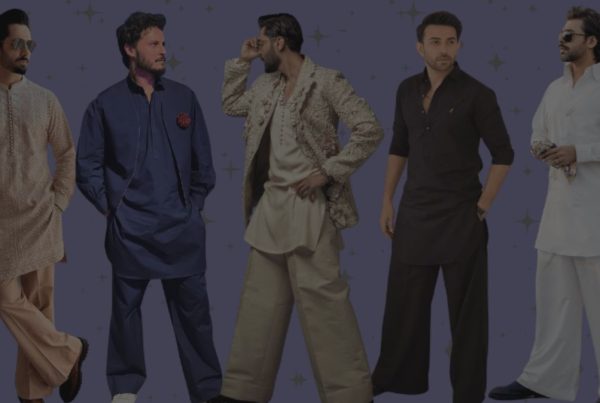The fashion industry in Pakistan is experiencing a dynamic transformation in 2025, as technology-infused designs redefine traditional aesthetics. Smart fabrics with temperature-regulating properties and wearable tech accessories, such as LED-embroidered dupattas, are blending cultural heritage with modern innovation.
This blog explores the rise of these technologies in Pakistani fashion, profiles brands like Generation that are experimenting with tech-inspired collections, and highlights their appeal to the tech-savvy youth. We’ll also provide practical styling tips to incorporate these innovative pieces into everyday wardrobes, ensuring you stay stylish and connected in 2025.
The Rise of Smart Fabrics and Wearable Tech
Smart fabrics, also known as e-textiles or intelligent textiles, are advanced materials embedded with electronic components like sensors, LEDs, or temperature-regulating fibers. These fabrics can adapt to environmental conditions, monitor health metrics, or even generate energy, offering functionality beyond traditional textiles. Wearable tech includes accessories like smartwatches, fitness trackers, and clothing with integrated technology, such as LED-embroidered garments.
Globally, the smart fabrics market is booming, valued at USD 2.48 billion in 2022 and projected to reach USD 22.72 billion by 2030 with a compound annual growth rate (CAGR) of 31.3% from 2023 to 2030. This growth is driven by increasing demand for wearable technology, advancements in textile manufacturing, and applications in healthcare and military sectors.
In Pakistan, the fashion industry is tapping into this trend, with designers integrating smart fabrics into traditional garments like kurtas, shalwars, and dupattas. The country’s first manufacturing and assembling industry for smart wearables, launched in 2025 by RONiN, marks a significant step toward technological independence, reducing reliance on imported tech accessories and fostering local innovation.
The integration of technology into fashion aligns with global trends toward sustainability and functionality. For instance, smart fabrics designed to be durable and energy-efficient appeal to eco-conscious consumers. In Pakistan, where over 80% of the 255 million population uses mobile phones, the demand for tech-infused fashion is rising, particularly among the youth who value both style and innovation.
Source: Grand View Research – Smart Fabrics Market Size, Share & Growth Report, 2030, Nerdbot – Pakistan’s Leap into Smart Wearables
Generation’s Tech-Inspired Collections
Generation, a leading ready-to-wear fashion brand in Pakistan since 1983, is at the forefront of this technological revolution. Known for its innovative designs and celebration of Pakistan’s textile heritage, Generation has reportedly introduced tech-inspired collections in 2025 that blend smart fabrics and wearable tech with traditional craftsmanship.
While specific details on their smart fabric offerings are limited, their “Smart Summer” collection is said to feature lightweight kurtas made from temperature-regulating fabrics, ideal for Pakistan’s hot climate. These fabrics adapt to the wearer’s body temperature, ensuring comfort during long summer days.
Another highlight is Generation’s “Luminous Nights” line, which includes dupattas with LED embroidery that illuminates in low-light settings, adding a futuristic flair to traditional attire. These pieces are crafted to maintain the aesthetic appeal of Pakistani fashion while incorporating modern functionality, such as programmable LED patterns that can be controlled via smartphone apps. Generation’s focus on ready-to-wear clothing makes these tech-infused designs accessible to a wide audience, from urban professionals to fashion-forward youth.
Beyond Generation, other Pakistani brands like Sapphire and Sana Safinaz are also exploring technology-driven fashion. Sapphire, ranked as Pakistan’s top fashion brand on Instagram in 2025, is experimenting with AI-driven shopping experiences and sustainable fabrics, which could pave the way for smart fabric integration.
Sana Safinaz, known for its luxurious designs, is incorporating modern cuts with traditional embroidery, potentially setting the stage for tech-infused collections. However, Generation’s emphasis on ready-to-wear and its reported foray into smart fabrics make it a standout in this space.
Source: Generation Official Website, StarNgage – Top 100 Fashion Brands of Pakistan in 2025
Other Brands Embracing Technology
In addition to Generation, several Pakistani brands are exploring tech-infused fashion, contributing to the industry’s evolution. For instance, the launch of Pakistan’s first smart wearables manufacturing industry by RONiN in 2025 has spurred interest in locally produced tech accessories. This initiative supports the creation of smart jewelry and wearable devices that complement traditional outfits, such as smart bangles that monitor fitness metrics or earrings with embedded sensors.
Brands like Alkaram Studio and GulAhmed Fashion are also adopting digital tools, such as AI-driven shopping platforms and virtual fashion shows, to enhance the consumer experience. These platforms allow customers to explore personalized fashion choices, which could soon include smart fabric options. The integration of technology is further supported by Pakistan’s “Digital Pakistan” initiative, which aims to foster innovation and entrepreneurship in the tech sector, indirectly benefiting the fashion industry.
Source: Zigron – Why Pakistan is Your Next Technology Hub, Vocal Media – Women’s Fashion Trends in Pakistan 2025
Appeal to Tech-Savvy Youth
The tech-savvy youth of Pakistan, part of a population where mobile phone usage exceeds 80%, are a key driver of the demand for tech-infused fashion. This demographic, often active on social media platforms like Instagram, values clothing and accessories that combine style with functionality.
Smart fabrics, such as temperature-regulating kurtas, offer practical benefits for daily wear, especially in Pakistan’s warm climate. Wearable tech accessories, like LED-embroidered dupattas or smart jewelry, serve as bold fashion statements, perfect for social events or casual outings.
The appeal of these innovations extends beyond aesthetics. Many smart fabrics are designed to be durable and energy-efficient, aligning with the growing emphasis on sustainability among younger generations. For instance, eco-friendly smart fabrics that reduce energy consumption resonate with environmentally conscious consumers.
Additionally, the ability to customize wearable tech, such as programming LED patterns on a dupatta, adds a layer of personalization that appeals to tech-savvy individuals.
The rise of digital platforms, such as virtual fashion shows and AI-driven styling assistants, further enhances the appeal of tech-infused fashion. These tools allow young consumers to explore and experiment with new styles, making fashion more interactive and accessible.
As Pakistan’s fashion industry continues to evolve, the integration of technology is likely to attract a broader audience, particularly among the youth who see fashion as an extension of their digital lifestyle.
Source: Nerdbot – Pakistan’s Leap into Smart Wearables, World Economic Forum – AI Fashion Show in Pakistan
Styling Tips for Tech-Infused Fashion
Incorporating tech-infused fashion into your wardrobe is both exciting and practical. The following table provides styling tips to seamlessly blend these innovative pieces into everyday and special-occasion looks:
| Tech-Infused Item | Styling Tip | Occasion |
|---|---|---|
| Temperature-Regulating Kurta | Pair with traditional shalwar or modern jeans for a fusion look that ensures comfort in warm weather. Add minimal jewelry to keep the focus on the fabric’s functionality. | Casual or semi-formal |
| LED-Embroidered Dupatta | Layer over a monochrome dress or kurta for a striking evening look. Use a smartphone app to customize LED patterns for added flair. | Festive or evening events |
| Smart Jewelry | Combine smart bangles or earrings with fitness-tracking capabilities with a traditional lehenga or a casual co-ord set for a tech-chic vibe. | Casual or formal |
| Smart Fabric Co-Ord Set | Opt for a matching set with health-monitoring features, styled with sneakers for a modern, urban look. Add a statement handbag for a polished finish. | Casual or brunch |
These styling options allow you to celebrate Pakistan’s fashion heritage while embracing the functionality and innovation of smart fabrics and wearable tech. For instance, a temperature-regulating kurta can be a wardrobe staple for daily wear, while an LED-embroidered dupatta can elevate your look for weddings or parties. Smart accessories, such as fitness-tracking jewelry, add a subtle tech element that complements both traditional and contemporary outfits.
Conclusion
In 2025, Pakistani fashion is embracing a new era of innovation with the rise of smart fabrics and wearable tech. Brands like Generation are leading this transformation, blending traditional craftsmanship with cutting-edge technology to create collections that resonate with the tech-savvy youth. From temperature-regulating kurtas to LED-embroidered dupattas, these innovations offer a perfect blend of style, functionality, and sustainability.
As Pakistan’s fashion industry continues to evolve, supported by initiatives like the country’s first smart wearables manufacturing industry, the future looks bright for tech-infused fashion. By incorporating these pieces into your wardrobe, you can stay ahead of the curve while celebrating Pakistan’s rich cultural heritage.







